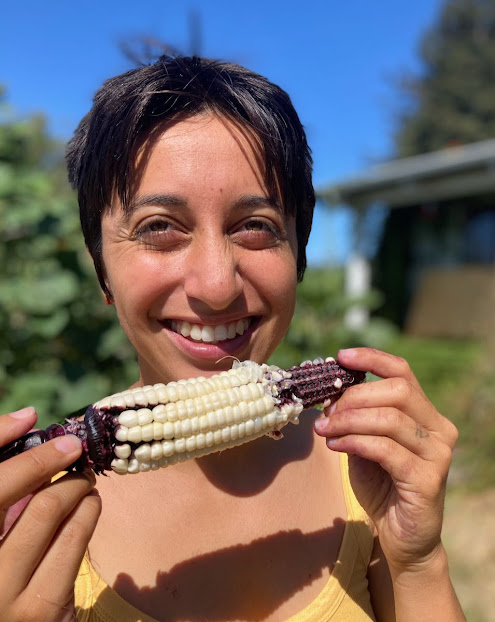Aysha
We all want and need to be seen and heard, this is how we grow. Especially when young, it is beneficial to experience ourselves in the mirror of “beholders” who generously pay good attention. From there we wrestle with the world, small and large, with our self-image, doubts, insecurities, grandiosities, yearnings. To be seen for who we truly are – unique, exquisite, each with a very specific path and purpose. A lifelong endeavor. Elders with self-knowledge become a clearer mirror. Not just applauding – that too – but giving guidance, encouragement, mentorship and friendship across the ages. When we older people are grounded and free to be ourselves, we can hold the pain, confusion, and anger of those newly exploring life within the overwhelming chaos of societal forces. Listening with attentive curiosity, gentle questions. Trust arises. Highlighting what needs focus or space, anchoring. When young, it takes so much courage to discover, test, and share our true self beyond our small circles and tribes. How to let our soul be seen, in a world that seems to only care about titles, money and fame? I myself was lucky to have had mentors up to 42 years my senior.
In this mini-series of young people’s voices, Aysha, at 29 years old, is another youngster who deserves to be seen and heard by many, by the world. Very courageously she has been moving in the academic world as well as in the world of farmers, and activists. She is learning to be a warrior, and live from her center, advocating for others and herself. Already, Aysha has made herself so useful. Applauding her, I am grateful for her brightly intelligent, inventive, elegant, and generous presence in my life. As you read below you will see what I mean. Beautiful....
Here is Aysha in her own words:
I met Karina circa 2017 when I first moved to California, through a friend who had helped with the distribution and outreach campaign for one of her films. It wasn’t until summer of 2020, when I developed a tremor and became concerned about my health, that I began studying T’ai Chi with her. The journey has so far been nothing short of miraculous. With Karina I am learning to find ease and to literally come to my senses, to develop health and knowledge through specific sense experience rather than through the concepts cycling through my mind. In the process, Karina is generous with me in ways that I only partially understand – she sees and holds me, she connects me with a long lineage dedicated to practicing balance in a world now out-of-balance, she models an integrated life.
At graduation in June 2023
I earned a Ph.D. in June 2023 in Environmental Studies at UC Santa Cruz, where I studied inequality in California’s food system through a feminist and sociological lens. I learned a lot of big words and concepts that I only find useful when tempered with what I am learning from Karina about coming into body and feeling. For example, much of my academic, professional, and community work centers on collaborations with a network of immigrant campesinos, mostly from Mexico, who are developing their own small-scale, diversified farm businesses in the Salinas/Watsonville/San Juan Bautista area. It is essential that my analysis of economic inequality is coupled with a practice of relating on the human level, sharing reciprocally, and finding nuance and opportunity in the margins of stories that are often told superficially – such as those of farmworker struggles in California. My T’ai Chi study with Karina is teaching me how to penetrate more deeply into the intricacies of every interaction so that I and the campesinos I work alongside can be more creative in the ways that we care for the land and for one another. I am inspired by this element of Karina’s film work: she is present with her subjects in a way that avoids cliches and allows for new insights, for new possibilities to unfold. Currently, I am working with farmers to build soil health, to develop and maintain irrigation infrastructure for small farms, to plant species that support pollinators, and to envision cooperative marketing strategies.
Beyond that work, I am part of a queer and trans Asian garden group in Santa Cruz focused on cultivating and cooking traditional Asian foods; I am studying jazz piano; I am watching the offspring of Karinaland nasturtiums climb their way up my patio fence!
P.S. About my name:
My name is Aysha, which is actually my middle name – my first name is Kaitlyn, last name Peterson – and together my names tell a very special story about my ancestral homes. Aysha is a common name throughout the Islamic world and is common in Multan, which is located in present-day Pakistan and is the original home of my maternal ancestors. Despite Aysha being a typical Muslim name, that side of my family is actually Hindu. In 1947, when Pakistan and India split and millions of people were forced to relocate across the border, my maternal grandparents were forced to leave their homes and move to present-day India. The fact that I have a Muslim name despite decades of violent religious conflict is a sweet homage to my ancestors in Multan who, pre-Partition, lived in a very mixed community of Muslims, Hindus, Sikhs, and people of other religious affiliations. The name Kaitlyn refers to my Irish ancestry (on my paternal grandmother’s side), while Peterson refers to my Swedish ancestry (on my paternal grandfather’s side). Growing up in the diaspora as queer and mixed-race, I have felt little sense of belonging and so love how my names give me a specific sense of place in the world.

.jpeg)

.jpeg)



Comments